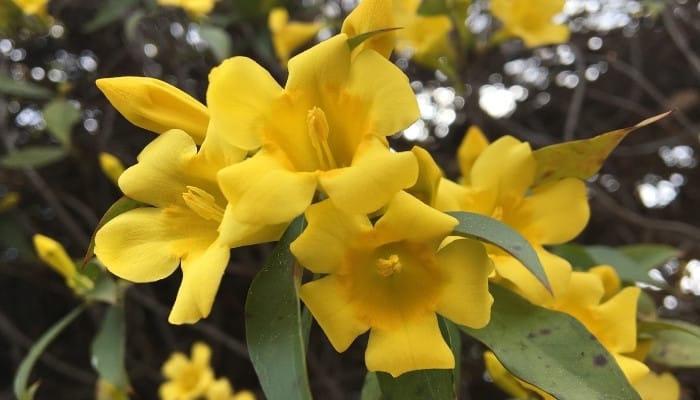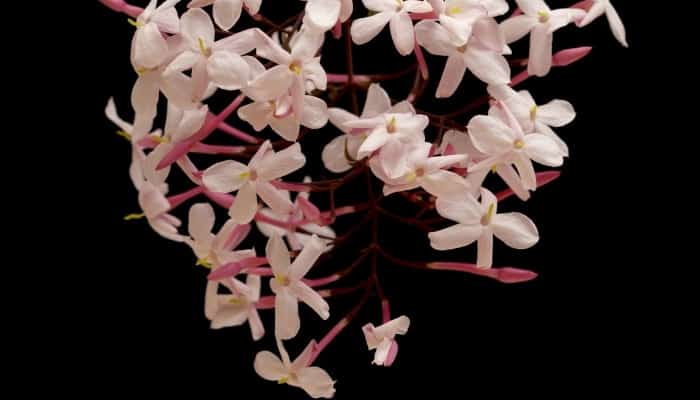Despite appearing calm and elegant at a distance, deer can become quite troublesome when they enter your garden. As experienced gardeners, we have encountered numerous incidents of deer encroaching upon our gardens.
One plant we’d like to consider today is the beautiful jasmine plant. Is jasmine deer resistant? We’ll take a look at that question and learn more about some of this plant’s varieties.
Is jasmine deer resistant? Jasmine is considered to be deer resistant. Not only do deer dislike its strong perfume-like scent and flavor, but some species are toxic to deer and other animals, and deer instinctively leave them alone. Very hungry deer may nibble on jasmine, but severe damage is rare.
Because there are so many species of jasmine, there’s a lot more to learn to ensure this plant is the right choice for your garden.
Read on to learn more about the different kinds of jasmine plants and which are most disliked by deer.
Will Deer Eat Jasmine Plants?
It’s pretty safe to say that deer generally leave jasmine plants alone, but with so many different kinds of jasmine out there, it doesn’t hurt to dive a little deeper.
Is Star Jasmine Deer Resistant?
Star jasmine (Trachelospermum jasminoides) is one of the more fragrant species of jasmine. That being said, it is considered deer resistant. It’s also worth it to note that this species is disease-resistant as well.
Will Deer Eat Night-Blooming Jasmine?
Like most other species of jasmine, deer do not usually eat night-blooming jasmine.
In fact, night-blooming jasmine (Cestrum nocturnum) is one of the few species that is deemed toxic for deer – and other animals, for that matter.
Because this plant makes them sick, they tend to stay away from it.
Is Winter Jasmine Deer Resistant?
Yes, winter jasmine is deer resistant. In fact, Rutger’s own New Jersey Agricultural Experiment Station gives them a B rating in deer resistance, which means that they are seldom ever severely damaged by deer.
Will Deer Eat Asiatic Jasmine?
Asiatic jasmine (Trachelospermum asiaticum)is a hardy, dense evergreen that is tolerant to a wide range of things, including drought, salt, and deer.
It’s a great option for anyone looking to beautify a difficult site with poor soil quality and little protection.
Do Deer Eat Pink Jasmine?
Pink jasmine (Jasminum polyanthum) is an excellent climbing plant, so it’s easy to keep it high and away from any interested party such as deer.
But even so, deer aren’t a huge concern as they typically stay away from this fragrant plant. While it’s not toxic, the animals don’t find it particularly tasty.
Is Carolina Jasmine Deer Resistant?
Carolina jasmine is also known as yellow jasmine or Gelsemium sempervirens and boasts yellow, trumpet-shaped flowers. This jasmine, too, is deer resistant and also very fragrant and sweet.

How Many Types of Jasmine Are There?
According to several gardening experts, there are about 200 different species of jasmine. Some are vines while others are more like shrubs.
The majority of these species originated in warm climates including Asia, but they have been widely transplanted to other parts of the world today.
Which Type of Jasmine Is the Most Fragrant?
Many types of jasmine are very fragrant, but one of the most fragrant kinds is common jasmine (Jasminum officinale).
This plant blooms during the summer and the flowers stay around for part of the fall.
Common jasmine has a strong, sweet smell that’s quite pleasant and widely enjoyed by many. Some other fragrant jasmines include star jasmine, Italian jasmine, and pink jasmine.
What Is the Hardiest Jasmine?
Although all jasmine varieties prefer Zone 6 weather or warmer, there are some cold-hardy species you can attempt to keep throughout the winter.
Winter jasmine is one of the hardiest jasmines out there.
It often blooms as early as January, and although its flowers are gorgeously bright yellow, it does not carry the same fragrance as other jasmines.
Not only does this plant withstand cold temperatures well, but the early blooms are very pleasant during cold, dreary months.
Which Jasmine Is Best?
In terms of landscaping, you can’t go wrong with common jasmine for your property. Its white flowers and greenery are classically beautiful, and they do well in pots.
Italian jasmine and pink jasmine (Jasminum polyanthum) are a couple of the best choices as far as color goes.
Italian jasmine blooms bright yellow flowers that last for a long time, while pink jasmine grows fragrant, pale pink flowers that are stunning.
Related Questions:
Will Rabbits Eat Jasmine?
Rabbits are foragers by nature, so there’s a good chance a rabbit will try to eat your jasmine if it has easy access to it.
Jasmine isn’t at the top of a rabbit’s list of favorite plants, but it’s not out of the question either.
Because jasmine has a strong fragrance, a rabbit might avoid it. However, there’s no plant that is truly rabbit resistant.
Can You Grow Jasmine in Pots?
Because jasmine plants are growers, many people choose to plant them in the ground with trellises to climb. However, you can plant jasmine in a pot as long as it’s large enough.
I recommend choosing a container that is at least 40 centimeters in all directions to accommodate the plant’s root system.
You may also need to repot your jasmine plant every 2 or 3 years if it outgrows its original pot.
You will know when it’s time if you start to see its roots growing out of the pot’s drainage holes and wrapping around the pot.
Final Thoughts
Jasmine plants are known for their beautiful, small flowers, gorgeous colors, and strong fragrance.
While a deer might occasionally snack on your jasmine plants, it’s more likely that their strong smell will keep these animals away.
In fact, many jasmine species are toxic to deer and will make them sick, which is another reason they might leave your plants alone.
That’s good news, considering what a stunning touch this plant can add to your home and landscape!
Sources:

